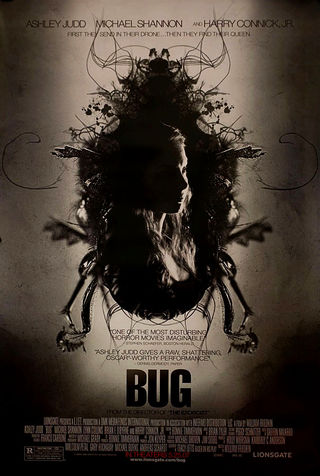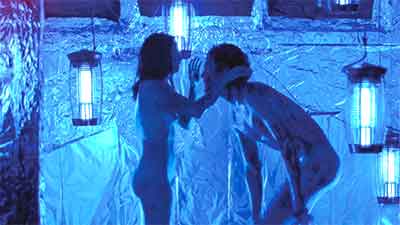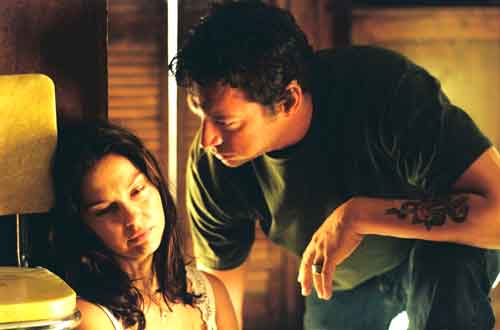 It’s been awhile since director William Friedkin made anything to match his seventies masterworks THE FRENCH CONNECTION and THE EXORCIST, but BUG handily accomplishes that task. It’s dark, disturbing and searingly intense in its pitiless dissection of paranoid insanity.
It’s been awhile since director William Friedkin made anything to match his seventies masterworks THE FRENCH CONNECTION and THE EXORCIST, but BUG handily accomplishes that task. It’s dark, disturbing and searingly intense in its pitiless dissection of paranoid insanity.
It may seem difficult to understand in light of William Friedkin bummers like THE GUARDIAN and JADE, but Friedkin was in fact one of the foremost moviemakers of the seventies. The tough, jittery intensity of his films was without precedent, and preceded the work of guys like Oliver Stone and David Fincher. Yet even a director as skilled as Friedkin is only as good as his material, and he turned out some real turds during the eighties and nineties (DEAL OF THE CENTURY, anyone? How about RAMPAGE?).
BUG, made at the end of the filmmaker’s sixth decade, was a big surprise. Adapted from the acclaimed play by Tracy Letts, it’s a daring film containing all the technical virtuosity and nail-biting tension of Friedkin’s best work. If it resembles anything it’s “Nightcrawlers”, an episode of CBS’s NEW TWILIGHT ZONE Friedkin directed back in 1985. “Nightcrawlers” was reportedly called the most intense half-hour ever broadcast on American television by one CBS executive, and has been blamed for the erosion of the NEW TZ’S ratings. Quite simply, the episode, about a Vietnam veteran’s horrific memories infecting and eventually overtaking the residents of a roadside diner, was too much for squeamish viewers.
I believe the same is true of BUG, which did little-to-no business during its June 2007 theatrical run (a full year after it premiered at the ’06 Cannes Film Festival). Of course, a thoroughly misguided marketing campaign by Lionsgate didn’t help its chances–based on the ad slicks you’d be justified in mistaking it for a sequel to FOOD OF THE GODS! Let’s hope that with BUG now readily available on DVD it will finally find its audience.
The lonely Agnes works at a lesbian bar and lives—or rather subsides—in a secluded desert motel. When not working Agnes has cocaine parties with her lesbian pal R.C., fields hang-up calls apparently made by her abusive ex Jerry, and pines for her long lost son, who years earlier vanished from a supermarket.
One night R.C. introduces Agnes to Peter, a nondescript drifter. The two are left alone together and Agnes finds herself unexpectedly charmed by Peter, a kind-hearted and (like herself) profoundly lonely individual. But he’s also deeply paranoid, as he demonstrates by freaking out over a malfunctioning fire alarm, which makes a buzzing sound Peter believes is from bugs loose in the room.
As the relationship between Agnes and Peter deepens, Jerry reenters her life, apparently to reignite their stalled courtship. But Agnes is now fully under Peter’s spell, and in more ways then one: she entertains his delusions and begins to believe them—and, after having sex with Peter, actually enters into his paranoid world.
Peter claims he’s an escapee from a military hospital. While serving in the first Gulf War he was apparently subjected to chemical tests that left aphid egg sacks festering under his skin. The more time Peter spends with the increasingly unhinged Agnes, the crazier he becomes. Soon Peter is committing horrific acts like ripping an aching tooth out of his mouth with pliers and coating Agnes’ motel room with tin foil in an effort to contain the (imaginary?) bugs.
Around this time a self-professed military doctor enters the picture. He claims to know Peter, and to have information on Agnes’ missing child. Can this guy’s info be for real? Is he real? Is anything? No answers are forthcoming for our profoundly psychotic lovers—no comforting ones, anyway!
With BUG, William Friedkin has created an audacious, freaked-out horror love story that will doubtless be puzzled over and hotly debated for years to come. It’s a concentrated and often uncomfortably intense trip into total insanity, with an utterly relentless trajectory and uncompromising finish that render it virtually unique among modern horror films. Friedkin never quite overcomes the inherent staginess of the material, and it often veers dangerous close to unintentional comedy in its atmosphere of increasing hysteria, but that’s the price the film pays for its seriousness and integrity.
Friedkin directs with a slick and sure hand, yet conversely pays little respect to traditional cinematic grammar. He has no problem cutting in the middle of a sweeping camera move or freely juxtaposing different takes within a single shot (resulting in noticeable jump cuts). The camera angles are often wildly off-kilter, but do succeed in opening up a profoundly claustrophobic piece that takes place almost entirely within the confines of a motel room.
One of Friedkin’s chief virtues as a director has always been his spot-on eye for casting, and here he’s chosen the perfect actors to bring his twisted vision to life. Ashley Judd in the lead role reignites the fury and fearlessness of her early performances in films like NATURAL BORN KILLERS and NORMAL LIFE (redeeming herself after appearing in a string of forgettable Hollyweird thrillers), and Michael Shannon is equally fine as Peter, who psychotic or not clearly does see bugs invading every corner of his existence.
Ultimately BUG raises far more questions than it answers. Is Peter really infested with some kind of military-created disease or is that just one of his innumerable delusions? Does Agnes catch that apparent disease herself or simply become so caught up in Peter’s reality she comes to share it? And just how much of what the two experience is supposed to be “real”? No answers are forthcoming. That’s an awful lot of ambiguity for a single film, but Friedkin and writer Tracy Letts get away with it simply because they concentrate on what’s important: the two supremely damaged protagonists and their tragic love story.
Vital Statistics
BUG
Lionsgate
Director: William Friedkin
Producers: Holly Wiersma, Kimberly C. Anderson, Malcolm Petal, Gary Huckaby, Michael Burns, Andreas Schardt
Screenplay: Tracy Letts
(Based on the play by Tracy Letts)
Cinematography: Malcolm Grady
Editing: Darrin Navarro
Cast: Ashley Judd, Michael Shannon, Lynn Collins, Brian F. O’Byrne, Harry Connick, Jr., Neil Bergeron, Bob Neill


